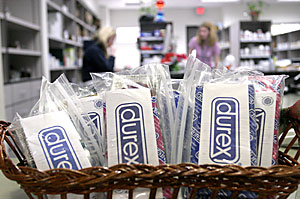 |
|
DJAMILA NOELLE GROSSMAN/Arizona Daily Wildcat
|
Condoms sit out for sale at the counter of the Campus Health pharmacy Tuesday. Many brands of condoms contain the spermicidal Nonoxnol-9, which a new study says increases the risk for STD transmission during anal sex.
|
|
|
By Cassie Blombaum
Arizona Daily Wildcat
Thursday, April 21, 2005
Print this
A frequently used spermicidal gel found in many condoms can cause irritation when the user is engaging in anal sex, according to the World Health Organization.
Once thought to prevent HIV and AIDS, Nonoxynol-9 is a lubricant that happens to have spermicidal properties, said Lee Ann Hamilton, a health educator at Campus Health Service.
"If used in gels and creams, (Nonoxynol-9) kills sperm," Hamilton said. "It also has viricidal and bactericidal properties."
Hamilton also said Nonoxynol-9 may have some negative effects on persons engaging in vaginal sex as well, but such effects are rare.
"It may irritate mucous membranes in some people, increasing the risk for STD transmission," Hamilton said. "In uninfected, monogamous couples using Nonoxynol-9 for pregnancy prevention, this is not an issue or risk."
Gary Rhine, a grant coordinator at the Gay Men's Health Project at the Southern Arizona Aids Foundation, said that by itself, Nonoxynol-9 works great as a spermicide but it does affect those engaging in anal sex.
"When a lubricant with Nonoxynol-9 is used for anal sex, the N-9 actually irritates the sensitive tissue around the anus and removes or eats away layers of tissue, making the tissue susceptible to HIV," Rhine said.
Floyd Meeks, a program coordinator for HIV prevention at the Pima County Health Department, said Nonoxynol-9 is a microbicide that kills bacteria and viruses.
"Because Nonoxynol-9 is a form of detergent, contact with Nonoxynol-9 can kill bacteria and viruses on your skin, but it also irritates the skin and causes an inflammation response."
Meeks said that at one time, Nonoxynol-9 was thought to be helpful in preventing HIV and sexually transmitted diseases because it had been shown to kill HIV in a test tube. For some time it was added to condoms to improve their effectiveness in preventing STDs.
When tested in people, however, Meeks said Nonoxynol-9 had negative results.
"When it got into the real world, many studies, including one with sex workers in Africa, found that women who used condoms with N-9 had more genital inflammation," Meeks said.
The Pima County Health Department no longer hands out condoms with Nonoxynol-9, but other condoms are available.
"As part of the public health mission of the Health Department, we give out condoms freely to people 13 years old and older."
Rhine said the Southern Arizona AIDS Foundation does not distribute condoms that contain N-9.
"We do not distribute condoms with N-9," Rhine said. "Most responsible agencies will not do that."
Hamilton said that Campus Health Service also stopped giving away condoms with Nonoxynol-9 a while ago.
"We do not give away condoms with Nonoxynol-9 since this lubricant has not been shown to reduce STD transmission," Hamilton said. "We have not given away N-9 condoms for many years."
Hamilton said that after the Centers for Disease Control and Prevention recommended years ago not to use condoms with Nonoxynol-9, Campus Health stopped giving them away.
"The CDC recommended it years and years ago," Hamilton said. "I give out condoms at educational presentations but none of them have nonoxynol-9."
Nevertheless, Hamilton said Campus Health does sell condoms with Nonoxynol-9 and students have the responsibility to choose the appropriate condom.
"We sell a wide variety of condoms, with and without Nonoxynol-9," Hamilton said. "Students can choose the most appropriate condoms for their situation."
According to the Centers for Disease Control and Prevention, Nonoxynol-9 should be used in conjunction with other forms of contraceptives, but it is not an effective means to prevent STDs.
Nonoxynol-9, however, may have some benefits, Hamilton said.
"N-9 seems to make sense for people wanting a little extra protection against unplanned pregnancy," Hamilton said. "But they've never been proven to actually increase pregnancy prevention effectiveness."
Hamilton said all condoms are an important way to ensure safe sex.
"Next to abstinence from sexual intercourse, condoms are the next best way to reduce the risks of STD transmission," Hamilton said. "Whether it has N-9 or not, using a condom will help reduce your chances of getting an STD."
Hamilton reiterated it is the condom in and of itself that helps ensure safe sex, not the lubricant found in it, and thus UA students should always use them for protection.
"Condoms - with or without spermicide - help to reduce the transmission of sexually transmitted diseases," Hamilton said. "They reduce the risks of vaginal, anal, or oral sex. Of course they are a very effective means of pregnancy prevention."
According to the 2004 Campus Health Health & Wellness Survey, 60 percent of females and 63 percent of males on campus usually or always use a condom.
Hamilton said she recommends buying condoms with recognizable labels that have latex and a reservoir tip.
"I recommend staying with bigger name brands," Hamilton said. "I don't recommend kinds you get in novelty stores, like glow in the dark and edible condoms."
Water-based lubricants should be used along with condoms, Hamilton said.
"Something like KY liquid or Astroglide," Hamilton said. "They will help reduce friction during sex and will reduce a condom failing."
